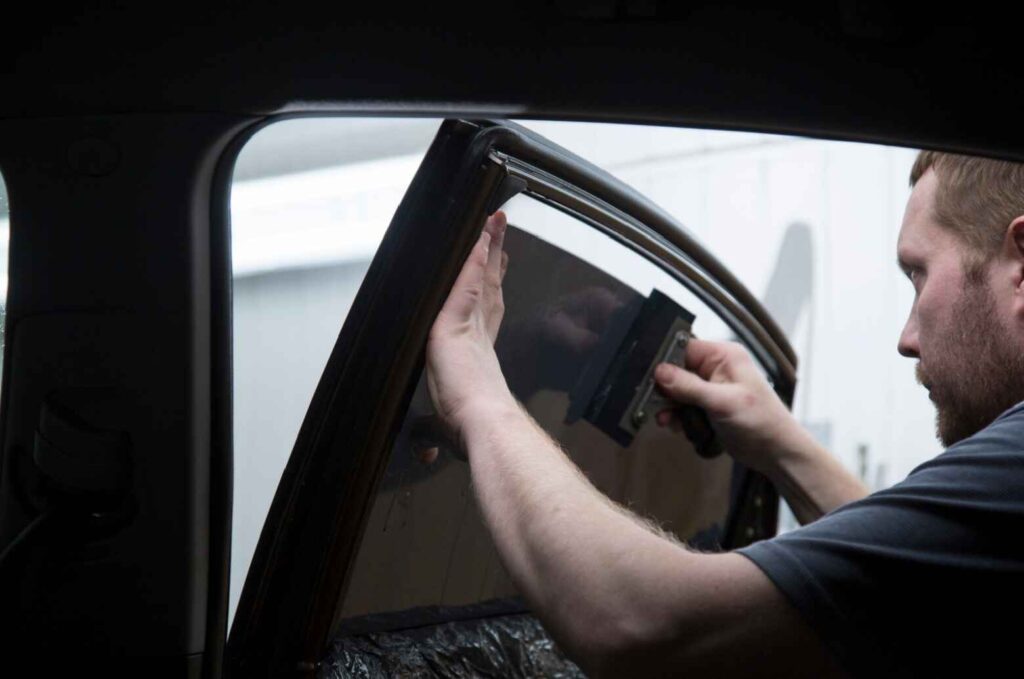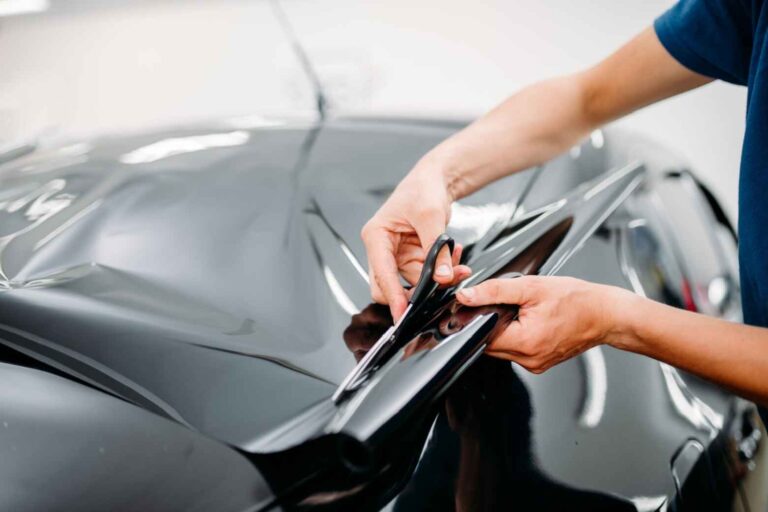Introduction
When it comes to how much to tint car windows? the costs can vary widely. On average, you can expect to pay anywhere from $100 to $550. But what makes the price tag swing so much? Let’s dive into the factors that influence these costs.
In this guide, we’ll dive deep into the factors affecting window tint costs, the different types of tints, and why professional installation is often worth the investment. By the end, you’ll have a clear idea of how to choose the best tint for your car and budget.
Table of Contents
What Factors Affect Car Window Tint Cost?
1. Type of Window Tint Film
Choosing the right window tint for your car can make a big difference in how much to tint car windows and how well it works. It’s like picking out the perfect outfit for your car! Let’s look at the different types of tints, so you can find the best one for your ride.
- Ceramic Window Tint: Premium quality with excellent UV protection and heat rejection. Costs range from $400 to $800.
- Carbon Tint: Durable and non-fading, priced between $250 and $650.
- Other Types: Dyed film is the cheapest, while metalized and hybrid window tint options provide mid-range performance. Crystalline tint film offers high clarity but is more expensive.
2. Vehicle Type and Size: Cost to Tint Car Windows
Tinting costs can vary based on your vehicle’s type and size. Larger or uniquely shaped windows often cost more. If you’re wondering how much to tint car windows, check out our table to see what tinting might cost for different car models and find out where your vehicle stands!
| Vehicle Type | Car Model | Estimated Tinting Cost | Remarks |
|---|---|---|---|
| SUVs and Vans | Toyota Highlander | $400 – $800 | Large windows increase costs. |
| Honda Odyssey | $450 – $900 | Includes rear and side windows. | |
| Ford Explorer | $350 – $850 | Larger side and rear windows. | |
| Chevrolet Suburban | $500 – $1,000 | Expansive windows increase labor costs. | |
| Luxury Cars | Tesla Model 3 | $600 – $1,200 | Special rear windshield design. |
| BMW 7 Series | $700 – $1,500 | Premium films often required. | |
| Mercedes-Benz S-Class | $750 – $1,600 | High-end finishes raise costs. | |
| Sedans and Compacts | Honda Civic | $200 – $450 | Affordable, fewer windows. |
| Toyota Corolla | $250 – $500 | Costs vary based on film type. | |
| Hyundai Elantra | $200 – $400 | Compact design makes tinting less costly. |
3. Installation Method
Choosing between DIY tint kits and professional installation can significantly affect the final cost. DIY kits range from $50–$100 but are often tricky to apply correctly. Mistakes like bubbles or peeling are common and can ruin the car’s appearance.
On the other hand, professional window tinting ensures a flawless finish and usually includes a warranty, but it’s more expensive, averaging $150–$800.
4. Local Tint Laws and Regulations
Before you find out how much to tint car windows, it’s important to know your state’s tinting laws. These rules tell you how dark or shiny your window tint can be. For example, most states let you put a small strip of tint on the windshield but have stricter rules for side windows. If you don’t follow these laws, you could get fined and might have to remove the tint.
Average Cost to Tint Car Windows
Wondering how much to tint car windows? Costs depend on your vehicle type and the tint you choose. Let’s break it down so you can find the best option for your ride.
- Cost Breakdown by Vehicle Type
- Side Windows: $50–$150 per window.
- Rear Windshield Tint Cost: $100–$250 for professional installation.
- Front Window Tint Cost: $50–$200, especially for anti-glare tint films.
- Budget vs. Premium Tinting Options
- Budget Tint Options: Dyed films cost $100–$300 for an entire vehicle.
- High-Performance Ceramic and crystalline films can cost $500–$1,000 but offer superior performance.
Benefits of Tinting Car Windows
1. UV Protection and Heat Rejection
One of the biggest advantages of window tinting is blocking harmful UV rays, which can cause skin damage and fade your car’s interior. High-quality films, like ceramic window tint, can block over 99% of UV rays. Additionally, heat rejection films reduce the temperature inside your car, making it more comfortable and energy-efficient.
2. Improved Aesthetics and Privacy
Tinted windows add a sleek, stylish look to any car. For those who value privacy, darker tints or reflective window tints make it harder for others to see inside. These benefits are especially appreciated by owners of luxury vehicles or SUVs.
3. Safety and Durability
High-quality tints act as a protective layer, holding glass together in case of an accident. This reduces the risk of injury from shattered glass. Films like non-reflective tint films and hybrid window tints also maintain visibility while providing added strength.
Window Tinting Options for Every Budget

1. Affordable Window Tinting
- Look for deals on budget tint options or DIY tint kits.
- Check reviews to find reputable installers offering quality tint vs. cheap tint.
2. Luxury and Custom Tinting
- Custom car tinting is ideal for high-end vehicles like Tesla or SUVs.
- Premium tints like ceramic XR provide advanced heat rejection and UV protection.
How to Choose the Right Window Tint:
Selecting the best window tint for your car is essential for both style and function. This can also solve your problem like how much to tint car windows. Here’s how to make the right choice:
- Consider Your Needs
- Protection: If you need protection from the sun, choose a UV protection film or a high-heat rejection tint. These help keep your car cool and shield you from harmful UV rays.
- Aesthetics: For a stylish look, metalized film or dark window tints are great options. They offer a sleek appearance while providing privacy and some heat reduction.
- Look for Warranties
- Quality Assurance: A window tint warranty is important as it covers issues like peeling, fading, and bubbles. This ensures you get long-term value and peace of mind.
- Longevity: Investing in a tint with a good warranty means you’re protected from future problems and can enjoy your tint for years to come.
Window Tint Installation Process
1. Professional Installation Steps
Professionals begin with pre-tint window cleaning to ensure a smooth application. The film is then carefully cut, applied, and smoothed out to remove bubbles. Finally, the edges are trimmed for a seamless finish.
2. DIY Tinting Challenges
DIY kits are tempting but often lead to problems. Uneven application and bubbling can ruin the look and reduce the film’s lifespan. For premium automotive tint, it’s best to trust professionals.
Maintaining Tinted Windows
Taking good care of your tinted windows can make them last longer. Here are some tips:
- Clean Carefully: Use a soft cloth and mild soap when cleaning your windows. This will help prevent scratches and keep the tint looking good.
- Avoid Harsh Cleaners: Stay away from ammonia-based cleaners because they can make the tint fade. Instead, use gentle cleaners that are safe for tinted windows.
- Regular Maintenance: Clean your tinted windows regularly to keep them in good shape. Dust and dirt can build up over time, so it’s a good idea to clean them often.
- Check for Damage: Look for any signs of peeling, bubbling, or fading. If you notice any problems, take care of them quickly to avoid further damage.
- Be Gentle: When opening and closing your car doors or windows, be gentle. Rough handling can damage the tint.
By following these simple steps, you can make yourself save from changing car window tint and keep your tinted windows looking great and lasting a long time.
FAQs About How Much To Tint Car Windows
Q. What is the average cost of window tinting?
A: The cost of window tinting can range from $150 to $800. This depends on the type of tint film you choose and the kind of vehicle you have. For example, basic tinting is cheaper, but high-quality ceramic films can be more expensive.
Q. How much does it cost to remove old tint?
A. Removing old tint can cost around $100 to $200. The price depends on the size of the windows and how difficult it is to take off the old tint without damaging the glass.
Q. Can I tint my windshield legally?
A. Yes, but laws vary by state. Most states allow a small strip of tint at the top of the windshield, called an “eyebrow tint.” This helps block sunlight without affecting visibility while driving.
Q. What’s the best tint for luxury cars?
A. For luxury cars, ceramic or crystalline tints are the best options. These tints are popular because they provide excellent heat rejection, block UV rays, and maintain a clear view without darkening the windows too much.
Q. Does window tinting improve car value?
A. Yes, window tinting can improve your car’s value by protecting the interior from UV damage, keeping it cooler, and giving the vehicle a sleek, stylish look.
Conclusion
Window tinting enhances your car’s style, comfort, and safety. If you’re wondering how much to tint car windows, you’ll find that DIY tint kits offer a low-cost option, but professional installation ensures better quality and durability.
Whether you’re on a budget or looking for premium options, understanding the costs and benefits will help you make an informed choice. Ready to upgrade your car’s look and feel? Contact a trusted window tinting expert today.


